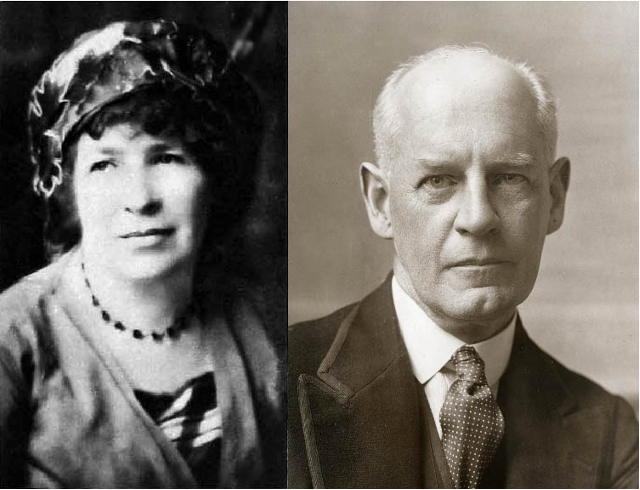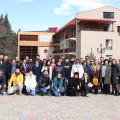The organisation known today as PEN International began in London, UK, in 1921, simply as PEN. Within four years there were 25 PEN Centres in Europe, and by 1931 there were several Centres in South America as well as China.
As the world grew darker just before the outbreak of war in 1939, PEN member Centres included Argentina, Australia, Bolivia, Brazil, Canada, Chile, Colombia, Egypt, India, Iraq, Japan, Mexico, New Zealand, Palestine, Uruguay, the US and others. All the Scandinavian countries were accounted for in the membership, as well as several countries in Eastern Europe. Basque, Catalan and Yiddish Centres were represented, too.
For over nine decades, then, we have been a genuinely international organisation, encompassing a wide array of cultures and languages, and today the overwhelming majority of PEN International’s 146 Centres come from outside Europe.
PEN was one of the world’s first non-governmental organisations and amongst the first international bodies advocating for human rights. We were the first worldwide association of writers, and the first organisation to point out that freedom of expression and literature are inseparable – a principle we continue to champion today and which is expressed in our Charter, a signature document 22 years in the making from its origins in 1926 and ratification at the 1948 Congress in Copenhagen.
PEN has grappled with the challenges to literature and freedom for nearly one hundred years, beginning just after World War I to the buildup and eruption of World War II, then throughout the Cold War and the fall of the Soviet Union and into today’s more nuanced climate worldwide. It has responded to modern history’s most dramatic turns, and its activists and advocates have included the most celebrated intellectuals of each era as well as countless, tireless and dedicated global members fighting to ensure that the right to write, speak, read and publish freely is forever at the heart of our global culture.
PEN: What’s in a Name?
Our name was conceived as an acronym: Poets, Essayists, Novelists (later broadened to Poets, Playwrights, Editors, Essayists, Novelists). Following World War Two, as the notion of an executive developed (see below), PEN became known as International PEN, comprising a growing number of Centres around the world. Over time, as our membership expanded to include a more diverse range of people involved with words and freedom of expression, the aforementioned categories no longer exclusively defined who could join. Today, PEN is simply PEN. In 2010, as part of a general rebranding, the organisation was renamed PEN International.
Genesis: a new kind of dinner club
Catharine Amy Dawson-Scott, a British poet, playwright and peace activist, founded PEN as a way to unite writers after the devastation of World War One. It was, at first, nothing more than a dinner club, providing a space for writers to share ideas and socialise. PEN clubs would be set up in other European cities, so writers on their travels would have a place to meet friends and fellows.
Guests at Dawson-Scott’s dinner included PEN’s first president, John Galsworthy, who spoke of the possibilities for an international movement – a League of Nations for Men and Women of Letters.

A question of politics
PEN held its first Congress in 1923, with 11 Centres taking part. Throughout the 1920s, PEN was unique in bringing writers together regardless of culture, language or political opinion – especially considering the political turmoil the world had begun to experience. In fact, one of the founding ideas guiding PEN was expressed as no politics in PEN Clubs – under any circumstances. PEN saw itself standing for freedom of expression, peace and friendship, not political debate.
By 1933, however, this thinking was challenged by the growing shadow of National Socialism in Germany. The delegates attending PEN’s Congress in Dubrovnik that year found it impossible to ignore the growing climate of repression and intolerance.
The German dissenters
Even as early as 1926, at PEN’s fourth Congress in Berlin, tensions had arisen between the German PEN Club and the PEN community in general. A number of young German writers – Bertolt Brecht, Alfred Döblin and Robert Musil amongst them – expressed their concern that PEN in their country didn’t represent the true face of German literature. They met with Galsworthy to express their dismay. The playwright Ernst Toller insisted that PEN could not ignore politics – that it was everywhere and influenced everything.
Burning books, burning indignation
In 1932, at the Congress in Budapest, an appeal was sent to all governments concerning religious and political prisoners. Galsworthy issued a five-point declaration – another stage in the evolution of the PEN Charter as it is today.
The following year saw political tensions rise to an unprecedented level within PEN. The British novelist H. G. Wells, who became PEN’s president in 1933 following Galsworthy’s death, led a campaign against the burning of books by the Nazis in Germany. German PEN failed to protest and, moreover, attempted to prevent Toller (who was Jewish) from speaking at the Congress in Dubrovnik. It subsequently had its membership withdrawn. If German PEN has been reconstructed in accordance with nationalistic ideas, a statement from PEN read, it must be expelled.
Writers behind bars: two early cases
By the late 1930s, PEN was active in appealing on behalf of writers and protesting against their treatment. The case of the Hungarian-born Arthur Koestler (then a journalist), who had been imprisoned in Fascist Spain and sentenced to death, was one early success: he was freed soon after PEN campaigned for his release.
(The great Spanish poet Federico García Lorca, on the other hand, was executed shortly after his arrest; tragically, PEN could only take action upon receiving a telegram – too late – informing the organisation of the danger he had faced. A resolution at the 1937 PEN Congress in Paris paid homage to Lorca and expressed dismay to the people of Spain at his death. This response, in fact, was likely a factor in the positive outcome of Koestler’s case.)
Postwar PEN
PEN looked very different at the end of World War Two. The original concept behind its creation as a club welcoming writers regardless of race, religion or creed had been fractured by reality. New groups of writers in exile had also been established in London and New York during the war.
Pressing issues faced PEN, such as how to deal with writers who had supported National Socialism in Germany and elsewhere, and how to ensure that the growing international PEN community could come together regularly enough and contact each other quickly when necessary. Thus the Executive Committee was formed.
In 1949, following the passage of a resolution introduced by the PEN American Centre, PEN acquired consultative status at the United Nations as ‘representative of the writers of the world’.
By the 1950s, PEN members were discussing the formation of a committee to examine cases of writers imprisoned or persecuted for their work and opinions. The Writers in Prison Committee came into being as a result, in April 1960. Despite – or perhaps because of – the Cold War’s polarising effect on the world, PEN’s influence spread internationally.
Wole Soyinka and a certain letter from Marilyn Monroe’s husband
In 1967, under the presidency of American playwright Arthur Miller, PEN appealed to Nigeria on behalf of a playwright whose name was, then, not widely known outside his country. Wole Soyinka had been marked for immediate execution by the country’s head of state, General Yakubu Gowon, during the civil war over Biafran secession.
A businessman conveyed the letter from PEN to Gowon, who noted the name of its author and asked he was in fact the same man who had married Marilyn Monroe (which indeed Miller had, in 1956). When assured that the very same man was asking for the Soyinka’s release, Gowon released his prisoner – who then left the country and, of course, went on to become one of the world’s most eminent poets and playwrights, winning the Nobel Prize for Literature in 1986.
Russians unmoved
Miller also travelled to the USSR to meet with the Union of Soviet Writers, and was told bluntly that Soviet writers wanted to join PEN but for one major obstacle: the Charter. Miller made it clear that altering the Charter to suit the Soviets was not up for discussion, adding that the vision it articulated was what united PEN worldwide. He nevertheless made sure that dialogue across the East–West divide was kept open; but it wasn’t until 1988 that Russian PEN was finally formed.
Over the next three decades to the turn of the millennium, PEN’s reach and impact were felt in most regions of the world. Our voice was increasingly valued and heeded, both at national and international levels, on issues such as freedom of expression, translation, the problems faced by women writers and the very simple question of how to bring writers together across cultures and languages. Our campaigns against the censorship, persecution, imprisonment and murder of writers also never flagged, becoming increasingly sophisticated.
The Rushdie affair
During the 1980s and 1990s, PEN’s work on behalf of persecuted and imprisoned writers became well known by the international community, amongst writers and governments alike. In 1989 Salman Rushdie, winner of the Booker Prize eight years earlier, received more international attention then he had bargained for with the publication of his fourth novel, The Satanic Verses. He was forced into hiding after Iran’s Ayatollah Khomeini issued a religious edict: the notorious fatwa (the word entered common usage in the West thereafter). The fatwa called for the author’s death for, supposedly, having insulted Islam in the novel. Rushdie’s ordeal is now part of literary history; he quickly became a symbol at the time, as a writer persecuted for his words. PEN played a key role in the global campaign that called for the withdrawal of the fatwa, and supported publishers of the book worldwide. Rushdie is, to this day, an active member of PEN International, and the former president of the PEN American Centre.
Ken Saro-Wiwa: a hero silenced
In 1995, the focus returned to Nigeria. PEN had, during the early 1990s, followed the case of the novelist, screenwriter and human-rights activist Ken Saro-Wiwa, who had first been arrested in 1992 for campaigning on behalf of the Ogoni people of the Niger Delta. The Ogoni were demanding greater autonomy, and Saro-Wiwa urged multinational petroleum corporations such as Royal Dutch Shell to take responsibility for clearing up the environmental damage to Ogoni lands caused by oil extraction.
He was released after a few months, but was detained again in January 1993 for one month following a peaceful protest that had been violently suppressed by Nigerian security forces. In May 1994, four Ogoni chiefs were killed by a mob of militant Ogoni activists. Saro-Wiwa, who had earlier been prevented from attending a meeting with these chiefs, was arrested again along with fourteen leaders of the Ogoni rights movement.
Charged with inciting the murders, he was convicted despite claims by many observers that the trial was rigged. On 10 November 1995, after an extensive international campaign led by PEN Centres around the world, Saro-Wiwa was executed. An international outcry ensued, and in 1996 a lawsuit was filed against Shell alleging the corporation’s complicity in human-rights abuses in Nigeria, including the killing of Saro-Wiwa. (In 2009 Shell agreed to pay a settlement of US $15.5 million, though the company continued to claim it was not guilty of the charge.)
Two assassinations
In October 2006, Anna Politkovskaya, a high-profile Russian journalist from the independent newspaper Novaya Gazeta who had received death threats for her reporting on the war in Chechnya, was found murdered in the lift of her Moscow apartment building. PEN International has since been at the forefront of efforts to bring her murderer(s) to account.
Three months later, in January 2007, the Armenian-Turkish writer and newspaper editor Hrant Dink was fatally shot in Istanbul. Dink had been charged under Article 301 of Turkey’s Penal Code for ‘insulting Turkishness’ through his writings, which challenged the Turkish government’s refusal to acknowledge the Armenian Genocide of 1915. Following his murder, PEN International helped support Dink’s family, and demanded a full and open investigation into his death. (A young Turkish ultra-nationalist was eventually sentenced as the assassin, and several other men were implicated and tried as well.)
100th aniversary
PEN International is now active in over 100 countries, and still echoes Dawson-Scott’s and Galsworthy’s original principles advocating freedom of expression, peace and friendship. Those writers’ voices, and those of the many others who joined them over the past 100 years of our existence, are still very much with us. Without them, PEN International could not have become the strong, vibrant, active movement it is today.



